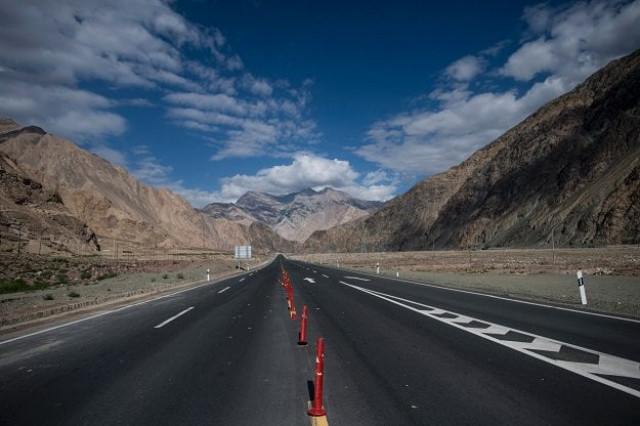Washington’s reservations over CPEC
Washington’s objections on CPEC is that project runs through the internationally disputed territory of Kashmir

The China-Pakistan Friendship Highway before the Karakorum mountain range near Tashkurgan in China's western Xinjiang province. PHOTO: AFP
Prima facie the US objections over CPEC are not substantial. However, these have been made to attain wider strategic objectives. It is also important to note that these objections have come as part of President Donald Trump unfolding strategy for South Asia, particularly the Af-Pak sub-region. Noticeably no objection was raised on CPEC by Washington during the era of President Barack Obama when the project was conceived and commissioned.
Insofar as Washington’s objections to CPEC are concerned, they are attributable to two reasons. Firstly, the US considers China as a strategic competitor and an ever-rising economic power. The second important reason is India, which is bitterly opposed to CPEC. The most obvious reason for New Delhi’s opposition is that it would give benefits to Pakistan, its arch-rival, and China, also her enemy. India also thinks that through CPEC, China would be able to have virtual control of the strategic port of Gwadar. In Donald Trump’s strategy for South Asia and Af-Pak, India is of central importance. Washington thinks that India could play an anchoring role in the peace and stability of the region by both lending a helping hand in Afghanistan and keeping a check on Pakistan. This American policy has fundamental flaws.
The hard reality of international politics is that every state thinks for itself and therefore it is the sovereign right of the US to conceive and implement policies as it deems appropriate to stop China from becoming the leading economic and, ultimately, military power. CPEC is part of the $900 billion plus China’s initiative of One Belt, One Road (OBOR) which would involve a number of north-south economic corridors across Asia as well as connecting the Eurasian landmass for trade and commerce. By investing colossally in the OBOR initiative China wants to become an economic superpower. However, American policymakers must think that more than China it is the question of stability and prosperity of Pakistan without which the whole region cannot be peaceful and stable. The oft-repeated diplomatic stance and core objective of Washington has been to see a stable and developed region so it must not have any issues at least with CPEC.
China since the launch of CPEC has been desirous of making Afghanistan part of it. One of the key reasons of America’s failure in Afghanistan has been that Washington could not economically develop Afghanistan and put its economy on sustainable lines. For Afghanistan, there are great prospects to achieve the much-needed economic stability and financial sustainability by joining CPEC. In this way Afghanistan would give a safe passage to Washington to leave Afghanistan. The question is that whether it wants to leave?
There cannot be two opinions that stability in the entire Af-Pak and South Asian region is dependent upon a politically stable and economically prosperous Pakistan. Here one could recall the historic words of former Indian PM Atal Behari Vajpayee on his historic visit to Lahore in 1998. Speaking to Pakistanis, Vajpayee said that India wanted to see a stable and prosperous Pakistan. If India is convinced that the stability of entire South Asia is connected to a stable and developed Pakistan, Washington must be convinced of the same reality.
Therefore, any such project in which the development and stability of Pakistan is involved must logically be supported by the US; more importantly when such development is not coming at the cost of US taxpayers’ money.
Published in The Express Tribune, November 8th, 2017.
Like Opinion & Editorial on Facebook, follow @ETOpEd on Twitter to receive all updates on all our daily pieces.















COMMENTS
Comments are moderated and generally will be posted if they are on-topic and not abusive.
For more information, please see our Comments FAQ